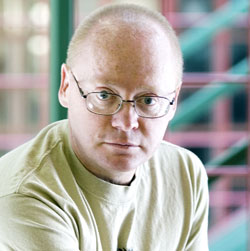Combining career training with democratic ideals
Canada Research Chair will develop institute into clearinghouse

Education Professor Emery Hyslop-Margison will officially earn Canada Research Chair Status over the summer.
Photo by andrew dobrowolskyj
Education Professor Emery Hyslop-Margison feels that students can be educated simultaneously as democratic citizens and as productive workers.
He intends to establish the Institute for Democratic Learning in Career Education when his Canada Research Chair is made official this July.
“There’s a bifurcation between career education and a traditional liberal education that prepares students for democratic citizenship,” Hyslop-Margison said in a recent interview. “I want to break down that dichotomy.”
He arrived at the Education Department last year from Ball State University in Indiana. His Tier 2 CRC status will now allow him to pursue his research on two different levels.
“Our initial research will be at the macro level. We will explore the career education policies of global organizations like the OECD (Organization for Economic Co-operation and Development), UNESCO and the World Bank,” he explained.
After that, researchers would go into the field in Canada, Australia and the U.S. to see how those policies and programs translate in secondary school classrooms.
The Institute will act as a clearinghouse and allow researchers to share their ideas and information. Ultimately, it will become a resource for international and domestic program and policy development.
Hyslop-Margison moved into education studies after earning his first two degrees in philosophy. “I was concerned about the practical application of those ideas and education offered a discipline where my work could make a difference.”
Ensuring that democratic principles are taught in the context of career education requires moving beyond “an instrumental approach that prepares students for a workplace they have no control over,” he said. “In a democracy, we can change the context through appropriate political channels.”
Not seeing the workplace as fixed opens the door to questioning why the market is the way it is. “We are operating in a neoliberal economy. Perhaps it is the best system, but in a democracy, we can’t simply transfer that assumption to students.”
Encouraging students to ask why goes beyond the context of the workplace to their own roles as workers. But character development goes beyond a laundry list of desirable traits. “You can’t simply talk about personal qualities or behaviour with no discussion of why these characteristics are appropriate.”
Hyslop-Margison said the waitress who understands customer service will not only receive better tips, but also will be more satisfied with her work because of the instrinsic rewards of offering superior service.
Of course, that type of career education works both ways. “Managers who understand how to treat employees fairly create a healthier working environment and a more productive workplace.”